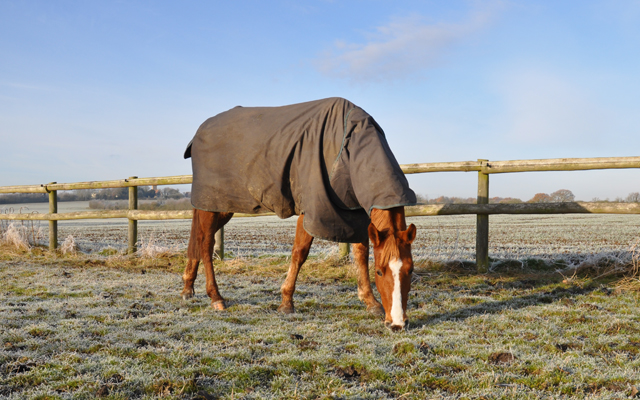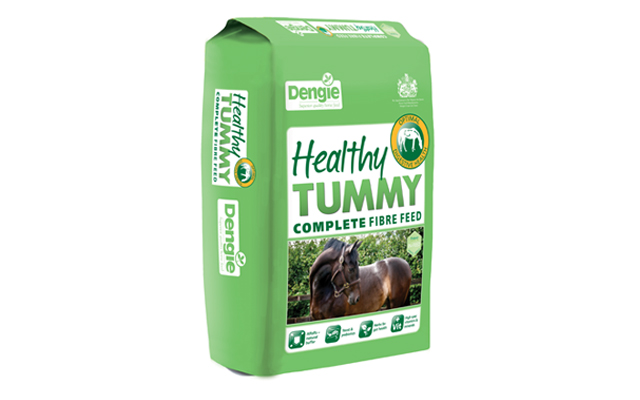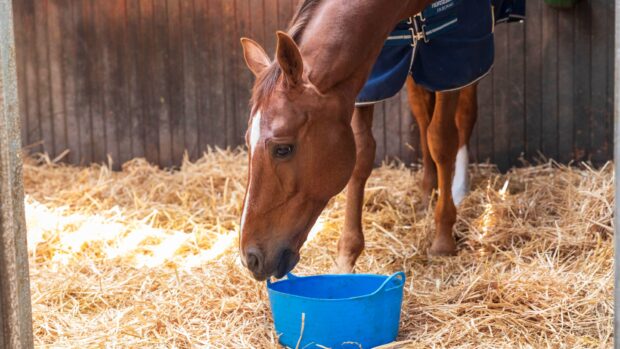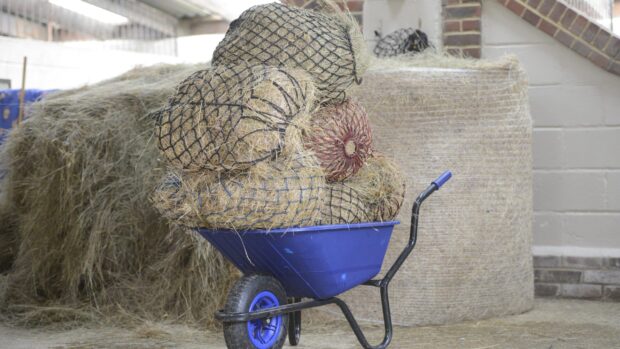Advertisement Feature
Dengie explains how feeding fibre can help your horse through the winter months
Winter brings many challenges, not least the adverse weather conditions and darker evenings meaning our horses spend longer in the stable and being exercised less. Feeding a fibre diet and allowing your horse to eat as nature intended will not only support digestive and behavioural health but can also help with weight maintenance.
Fibre and Behaviour
In their natural environment, horses will spend long periods of time grazing and eating fibrous material. Fibre, whether hay, haylage or Dengie fibre feeds, takes significantly longer to chew than mixes and cubes.
 Researchers discovered that a horse will chew a kilogram of hay 3,400 times in about 40 minutes but will chew one kilogram of oats 850 times in only 10 minutes. This shows that feeding fibre takes more chews – and keeps a horse occupied for much longer!
Researchers discovered that a horse will chew a kilogram of hay 3,400 times in about 40 minutes but will chew one kilogram of oats 850 times in only 10 minutes. This shows that feeding fibre takes more chews – and keeps a horse occupied for much longer!
How Fibre can Support Digestive Health
Equine Gastric Ulcer Syndrome (EGUS) is a painful digestive issue linked to a horse’s diet. Ulcers are an erosion of the stomach lining caused due to prolonged acid exposure. Common risk factors are low fibre, high-starch diets and high-intensity exercise. Fibre is important for maintaining stomach health as it encourages chewing and therefore saliva production which is rich in bicarbonates which help to buffer stomach acidity. Fibre also forms a mat on top of the acid helping prevent acid splash to the delicate squamous mucosa (top area of the stomach). Dengie Healthy Tummy combines chopped and pelleted alfalfa with an oil coating, herbs, vitamins and minerals plus Protexin In-Feed Formula. At 11.5MJ/kg Digestible Energy, Healthy Tummy provides energy for horses working at a medium level or horses in less work that need to gain weight. Get further advice on feeding horses prone to gastric ulcers.
Dengie Healthy Tummy combines chopped and pelleted alfalfa with an oil coating, herbs, vitamins and minerals plus Protexin In-Feed Formula. At 11.5MJ/kg Digestible Energy, Healthy Tummy provides energy for horses working at a medium level or horses in less work that need to gain weight. Get further advice on feeding horses prone to gastric ulcers.
Feeding Fibre for Weight Maintenance
Horses rely on microorganisms in their hindgut to break down fibre. This process not only produces volatile fatty acids, which are used for energy synthesis, but also thermal heat, which acts like your horse’s own central heating system.
Digestible fibre sources such as alfalfa and sugar beet alongside added oil can provide just as much energy as a conditioning mix or cube, but without the starch. Dengie Alfa-A Oil provides 12.5MJ/kg of Digestible Energy – equivalent to a conditioning mix or cube – but with TEN times less starch making it ideal for horses who need to gain weight, even if they have limited exercise. Get further advice on maintaining and gaining condition this winter.
For overweight horses and ponies, weight loss is easier to achieve at this time of year. Look for low-calorie feeds such as Dengie Hi-Fi Lite, Healthy Hooves Molasses Free or Hi-Fi Molasses Free – click here for some top weight watching tips!
Feeding Veterans
Horses and ponies in their senior years may need some additional support during the winter months. Poor dentition, weight loss, PPID and laminitis are just some of the problems an older horse may face. For those with poor teeth the winter months can be a challenge as reliance on hay or haylage increases. Soft, short-chop feeds, such as Hi-Fi Senior, are easy to chew as soft grass is blended with nutrient rich alfalfa. Hi-Fi Senior can use be used as a total or partial hay replacer and as it is more digestible than hay, can help poor doers to gain weight. Alfa-Beet or soaked Alfalfa Pellets can be added to the ration to provide extra calories. Both are easy to chew and aid hydration so ease the transition from a grass based to hay based ration.  Top Tips for Winter Feeding
Top Tips for Winter Feeding
- Feed plenty of forage and fibre-based feeds when your horse is stabled to encourage natural foraging behaviour helping to keep him occupied
- Choose ‘slow-release’ energy sources such as fibre and oil, for condition without fizz
- For weight gain, choose more digestible sources of fibre, such as alfalfa and sugar beet, as found in Alfa-Beet
- Offer a scoop of alfalfa-based feed prior to promote gut health
- Split the daily forage and feeds into as many small meals as possible, leaving the largest quantity overnight
- Make feed changes gradually and allow constant access to water
- Use the winter months to encourage weight loss
For friendly feeding advice and further information contact the Dengie Feedline on 0845 345 5115 or visit www.dengie.com where you can chat-live to a nutritionist.




